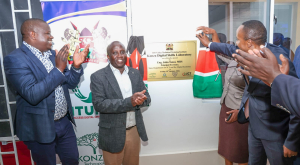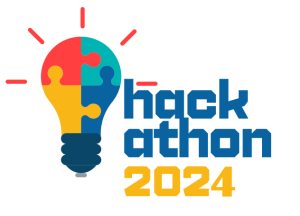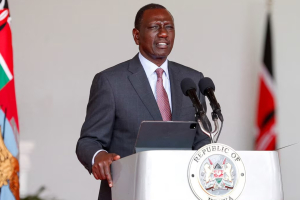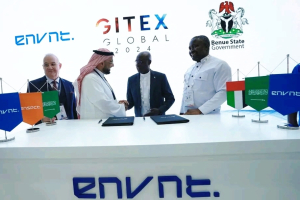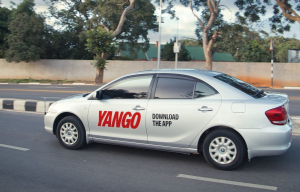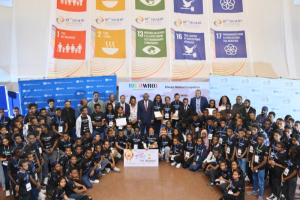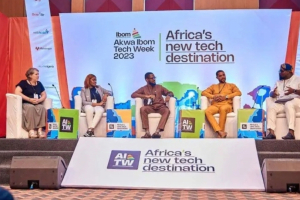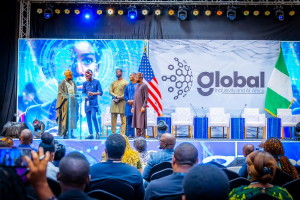Kenya Opens Jitume Digital Hub in Eldoret to Boost Digital Skills
The Ministry of Information, Communications, and Digital Economy, alongside the Konza Technopolis Development Authority (KoTDA), inaugurated a Jitume Digital Hub at Rift Valley Technical Training Institute (RVTTI) in Eldoret, Uasin Gishu County, on October 25.
The event was led by ICT Principal Secretary Eng. John Tanui. The Jitume hubs aim to enhance digital literacy and support employability and entrepreneurship for youth in the Rift Valley, aligning with Kenya’s Vision 2030 for a skilled, tech-driven workforce.
Google, ALX South Africa to Host Sub-Saharan Africa’s 1st Hardware Hackathon
Google has teamed up with ALX South Africa to host Sub-Saharan Africa’s first Hardware Hackathon on 1 November 2024 at ALX’s Braamfontein hub.
The event will bring 20 selected learners from ALX’s talent pool to tackle real-world challenges in server hardware, Linux, and networking, simulating the work of Google Data Center Technicians.
Participants will compete for prizes and potential job opportunities with Google. The partnership, part of Google’s broader outreach strategy, aims to upskill young African talent and prepare them for tech careers.
E-payment: Kenyan President Ruto Urges Banks to Connect to AfCFTA's PAPSS
Intra-African trade encounters numerous obstacles, including the absence of a unified payment system. The adoption of Papss addresses these challenges by streamlining payment processes and reducing dependence on foreign currencies, thereby promoting increased trade within Africa and enhancing economic integration.
Kenyan President William Ruto has called on commercial banks to expedite their adoption of the Pan-African Payments and Settlement Systems (Papss), urging them to transition away from using the U.S. dollar for intra-African trade. The president revealed this at the launch of the Micro, Small and Medium Enterprises Accelerator programme at the Kenyatta International Convention Centre, Nairobi, on Wednesday, October 16.
Ruto emphasized the need to reduce transaction costs on the continent, which currently result in Africa losing over $5 billion annually. “With Papss, we can conduct transactions in our local currencies, significantly lowering exchange rate challenges and reducing transaction costs for businesses across Africa,” he noted, further encouraging banks to sign on to the system to enhance regional trade.
Raimond Molenje, acting CEO of the Kenya Bankers Association, confirmed that the association is actively working with the Central Bank of Kenya to implement a national switch to the Papss system, which would facilitate smoother trade with neighboring East African countries. This development aligns with Papss's goal of creating a single market for Africa and increasing intra-continental trade.
Papss, which was introduced by the African Continental Free Trade Area (AfCFTA) in 2019, facilitates seamless payments in local currencies across African nations. Initially piloted in the West African Monetary Zone, it was formally rolled out by Afreximbank in September 2021, with full operations beginning in early 2022.
The AfCFTA creates a single market for goods and services, allowing Kenyan businesses to access a market of over 1.3 billion people and a combined GDP of over $3.4 trillion. This significantly expands their customer base and revenue potential.
Hikmatu Bilali
Nigeria: Benue State Signs MoU With Saudi IT Firm For Digital Infrastructure
Investing in digital infrastructure positions Africa for significant economic advancement by opening up opportunities for e-commerce, tech startups, and improved public services. Governments can leverage this trend to create jobs for its population
Governor Hyacinth Alia of Benue State signed a Memorandum of Understanding (MoU) with EVNT Technologies, a leading Saudi Arabian IT firm, aimed at transforming the state's digital landscape. The signing took place during the 2024 GITEX Global Summit in Dubai which ended on October 18.
The governor highlighted that this initiative “is a critical step towards realizing our vision of a truly digital Benue. It is about creating opportunities, empowering our people, and laying the groundwork for sustained economic growth."
Through the Benue Digital Infrastructure Company PLC (BDIC), the partnership will focus on expanding digital infrastructure, skills training, and digital policy development.
Hamad Al Saleh, founder of EVNT Technologies, expressed enthusiasm for making Benue a model for digital transformation in Nigeria. The implementation is expected to begin within 90 days, focusing on infrastructure development, capacity building, and digital innovation.
This move aligns with the National Digital Economy Policy and Strategy 2020 – 2030 (NDEPS), which aims to “transform the country into a leading digital economy providing quality life and digital economies for all.” Benue, by becoming a model for digital transformation, can leverage this trend to create jobs for its population.
Hikmatu Bilali
Zambia: Yango and Zindi Announce 2024 Lusaka Mobility Prediction Hackathon
Tech company Yango Group and Zindi, which connects organizations with data scientists, will host the 2024 Lusaka Mobility Prediction Hackathon on October 26. The competition will focus on predicting traffic patterns affected by weather.
The event will bring together data scientists and tech enthusiasts in Zambia to tackle real-world urban mobility challenges.
The hackathon aims to inspire Zambia's data science community by offering prizes to the top three participants. It is part of Yango’s commitment to driving urban solutions through data and technology.
Addis Ababa, Dar es Salaam Host World Robot Olympiad National Competitions
Africa's digital growth faces challenges, including infrastructure disparities, low internet access in rural areas, and limited digital skills among the workforce. Empowering youth through digital education initiatives can help bridge the digital divide and position Africa as a leader in global digital innovation.
Ethiopia and Tanzania hosted hundreds of young innovators gathered for the World Robot Olympiad (WRO) National Competitions on October 4.
Claver Gatete, Executive Secretary of the Economic Commission for Africa (ECA), said "We are thrilled to see Ethiopia’s young innovators competing at such a high level. This competition not only showcases creativity but also demonstrates Africa's potential to lead in technological solutions to our continent’s most pressing challenges."
Held at the United Nations Conference Center in Addis Ababa, Ethiopia, the event featured 100 Ethiopian finalists including 30 female competitors representing 14 STEM centers nationwide. The participants showcased their skills in robotics, artificial intelligence, and sustainability.
In Tanzania, the national competition, hosted at the University of Dar es Salaam, saw 39 students from 12 groups demonstrate innovative solutions to environmental and safety challenges. This year’s World Robot Olympiad theme, "Earth Allies," encouraged young innovators to develop environmentally friendly solutions, underscoring the urgent need for creative approaches to sustainability.
Ethiopia’s Kotebe STEM Center won first place with its ADAPTA-Multipurpose Robot, while Tanzania’s Azania Secondary School took top honors with an Automatic Fire-Fighting Robot. These winners will advance to the global WRO finals in Turkey later this year from November 28 to 30 2024.
For Pren-Tsilya Boa-Guehe, Head of Google Government Affairs and Public Policy, this “partnership with ECA and others aims to provide young African learners with opportunities to explore their curiosities, learn digital skills, and ultimately, be prepared to embrace the 4th Industrial Revolution.”
Supported by the Economic Commission for Africa (ECA), Google, and STEMPower, the event is part of a larger initiative aiming to equip 9,000 African students and 200 teachers with digital skills in AI and robotics across 14 countries on the continent. This aligns with Africa's goal to bridge the digital divide and capitalize on an estimated $712 billion digital economy by 2050.
The World Bank highlights that expanding digital access can help address unemployment and inequality by creating opportunities for entrepreneurship, education, and financial inclusion. With a significant percentage of Africa's population under 25, the continent’s youth are a driving force behind this digital shift.
Hikmatu Bilali
Akwa Ibom Tech Week 2024 to Feature $2.5M Venture Fund from Innovate Africa
Akwa Ibom state in Nigeria will host the Akwa Ibom Tech Week (AKTW) 2024 from October 28 to November 2, under the theme "Building a Resilient Innovation Ecosystem."
This year’s event aims to bring together local and global innovators to explore how the state can position itself as Africa’s next tech hub.
Innovate Africa, an early-stage investment fund will headline the event with a $2.5 million venture fund to support promising startups. Attendees will also have the opportunity to engage with Kristin Wilson, Innovate Africa's co-founder, through a series of curated fireside chats, knowledge-sharing sessions, and masterclasses throughout the week.
AFC, Itana Partner to Build Africa’s First Digital Economic Zone in Nigeria
Africa's digital economy is undergoing rapid expansion, but there is a growing need for infrastructure to support it. Creating a digital economic zone will provide the foundational infrastructure for this growth by enabling tech companies to operate in a streamlined, business-friendly environment.
Africa Finance Corporation (AFC) and Itana, Nigeria’s first licensed digital economic zone management company, have formalized a partnership to develop Africa's first digital economic zone. Announced at the Global Africa Business Initiative (GABI), on September 26, during the United Nations General Assembly (UNGA) in New York, the zone is intended to provide a seamless platform for global and Pan-African tech, finance, and service-based businesses to scale across Africa.
Samaila Zubairu, President & CEO of AFC, described the initiative as a "pivotal step" towards creating a hub for Africa’s digital economy, adding that it will cement “the Corporation’s commitment to driving innovation, job creation, and sustainable economic development across the continent.”
The Itana Digital Economic Zone, based in Lagos, Nigeria, will operate as an online jurisdiction, allowing businesses to incorporate and manage their operations remotely. This platform will be optimized with laws, tax incentives, and services geared toward supporting the digital economy, alongside eco-friendly live-work districts and a live-in accelerator program designed to foster innovation and sustainability in Africa’s tech ecosystem.
AFC will provide project development funding and lead the financing for phase 1 of the Itana project, which is expected to cost approximately $100 million. This phase includes the development of a tech campus in Lagos and startup funding through Accelerate Africa, a partnership between Itana and Future Africa.
This development provides a framework for businesses seeking to tap into Africa’s growing digital economy. The project will be located in Alaro City, within the Lekki Free Zone, and will collaborate with partners like Future Africa, PwC Nigeria, and the Charter Cities Institute.
Nigeria is home to one of the largest startup ecosystems in Africa. According to the Nigerian Investment Promotion Commission, the country raised over $1.2 billion in startup funding in 2021 alone. Creating a digital economic zone will provide much-needed infrastructure, legal frameworks, and incentives to accelerate the growth of these startups, making Nigeria a global tech player.
Hikmatu Bilali
African and Indian Organizations Partner to Boost Digital Skills
Africa lacks skills in emerging technologies like blockchain and AI, which are increasingly essential for the global economy. Developing a skilled workforce will enhance African nations' competitiveness, attract investment, and drive international collaborations as these technologies transform industries.
The Hub for Digital Excellence Academy (HFDE) has partnered with the India Blockchain Alliance (IBA) to advance digital education and training across Africa, the hub announced on September 5. The partnership aims to equip African youths with skills in emerging technologies such as blockchain and artificial intelligence (AI), enhancing their employability in the digital economy.
"The collaboration aims to stimulate economic growth, create job opportunities, and foster innovation. With Africa’s youth at the forefront, the partnership is set to position the continent as a major player in the global digital economy," said HFDE.
The collaboration follows the launch of HFDE's Digital Excellence and Emerging Technology (DEET) Academy, which focuses on providing practical, industry-relevant skills. Through this initiative, participants will gain hands-on experience in blockchain, AI, verifiable credentials, and real-world asset tokenization.
Founded in 2018, the India Blockchain Alliance is a leading organization in the blockchain sector. It will support HFDE's efforts by offering webinars and courses designed to address the growing demand for talent in tech-driven fields. The courses will cover topics including blockchain's global impact, AI’s applications across industries, and innovations in credential verification.
According to the 2023 report “Digitalization and Digital Skills Gaps in Africa” by the nonprofit Brookings Institution, the demand for jobs requiring digital skills grew significantly between 2010 and 2020. During this period, the percentage of jobs needing low digital skills declined from 47.6% to 31.6%, highlighting a shift toward roles that require higher digital competencies. The shift in job demand underscores the need for educational institutions to revamp curricula and prioritize digital skills training.
Additionally, the World Economic Forum notes that Africa has the world’s youngest population, with over 60% of its people under 25. By 2035, more young Africans are expected to enter the workforce each year than the rest of the world combined. The influx of young people into the workforce by 2035 underscores the urgent need for targeted educational initiatives in digital training.
Training in blockchain, AI, and other emerging technologies not only enhances employability but also fosters innovation and entrepreneurship, offering pathways out of poverty and into meaningful, high-value jobs. By equipping individuals with cutting-edge skills, this collaboration could stimulate economic growth across various sectors, including fintech, healthcare, and supply chain management.
Hikmatu Bilali
Nigeria Launches AI Fund with Google to Boost Innovation
AI adoption has the potential to increase productivity and create jobs, especially in tech. By investing in AI infrastructure and promoting collaborations between the public and private sectors, Nigeria aims to position itself as an AI leader in Africa.
In partnership with Google, the Nigerian government has launched a ₦100 million ($59,500) fund to support 10 startups leveraging Artificial Intelligence (AI) in their technology solutions. The initiative was announced on September 10, 2024, by Dr. Bosun Tijani, Minister of Communications, Innovation, and Digital Economy at the 2-day ‘Global Inclusivity and AI: Africa Conference’ in Lagos.
Today, we launched the N100million Artificial Intelligence Fund in collaboration with @googleafrica aimed at supporting Nigerian startups leveraging AI to build innovative solutions.
— Dr. 'Bosun Tijani (@bosuntijani) September 10, 2024
The AI Fund, which will be coordinated by @NCAIRNigeria, is a critical step in taking advantage… pic.twitter.com/pKyuz6SFhJ
Dr. Tijani emphasized the government's role in shaping AI policies that can influence both public and private sectors, stating, "If we get it right in the public sector, it will permeate the private sector and shape the future of things in our country."
The National Centre for Artificial Intelligence and Robotics (NCAIR) will coordinate the fund as part of the government's broader push to position Nigeria as a leader in AI technology.
Google's involvement in the fund reflects its commitment to Africa's digital future. In addition to the funding, the selected startups will gain access to Google's AI tools, mentorship, and a global network of experts.
Startups eligible for this funding must have at least one Nigerian founder and be focused on AI solutions with scalable potential. The application period will run from September 10 to September 25, with recipients announced in October.
This initiative is expected to accelerate AI adoption in Nigeria and further cement the country's position as a key player in Africa's digital economy. It aligns with broader strategies outlined in the country’s National Artificial Intelligence Strategy (NAIS).
Additionally, the 3 Million Technical Talent (3MTT) program, an initiative of the Federal Ministry of Communications, Innovation, and Digital Economy, complements these efforts by focusing on building a skilled workforce in tech and AI. This aligns well with the AI fund, which targets startups with high-impact potential, as seen in the recent partnerships between Google and Nigeria.
According to multinational accounting firm PricewaterhouseCoopers International Limited (PwC), AI could add up to $15.7 trillion to the global economy by 2030, with Africa benefiting from increased efficiencies and new business opportunities.
Hikmatu Bilali


